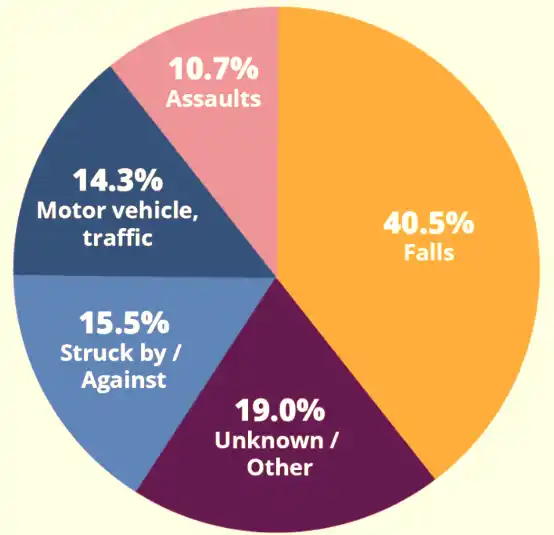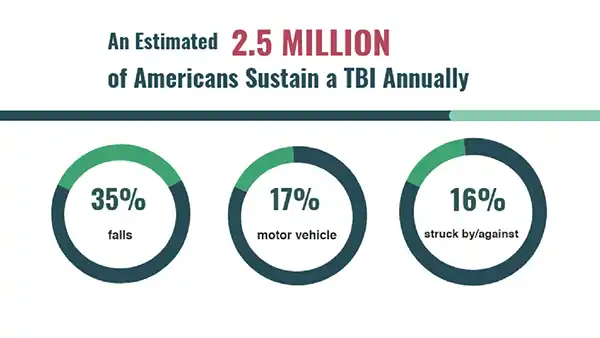Key Takeaways
- Traumatic brain injuries can have dire consequences, including disability and even death. TBI is caused by car injuries, gunshot wounds, birth injuries, etc.
- Signs of TBI include vomiting, blurry visions, memory loss, seizures, and many more.
- Treatments include immediate aid and recovery, which comprise medications and therapy
- Skilled Chicago Attorneys help in the investigation, negotiation, and pursuit of compensation for TBI victims.
A traumatic brain injury, aka a TBI, can have life-changing effects on patients. They can lead to permanent health consequences, disabilities, and even death. While a patient’s greatest ally is their medical team and family, Chicago personal injury attorneys, are offering services to help victims seek compensation for the accident or actions that led to their wound.
It is the result of either blunt force trauma to the brain, such as a coup-contrecoup injury, or piercing damage that breaks past your skull, such as from a workplace or car accident.
They can result in lifelong consequences that range from recurring headaches to cognitive disabilities.

While you should never leave head injuries to chance, sometimes a person isn’t aware they’ve been injured. Shock or lost memory can be the cause, or underestimating an impact. I
if you notice any of the following, you (or the person you notice them from) need to seek medical attention.
This is by no means an exhaustive list and only a medical professional can truly rule out whether there is a TBI at play or something else.
Brain damage cannot be reversed. That said, there are two categories of treatment: immediate aid and recovery.
Immediate aid is when you first seek treatment. Your doctor will monitor your blood pressure, blood flow, and oxygenation as they work to stabilize your body’s functions and prevent you from making the wound worse.
Once you are out of danger of further damage, they will evaluate your condition and damage. They will identify if you have a TBI and what kind so that they can form a treatment plan.
Treatment plans generally rely on a combination of medication to manage symptoms and pain and rehabilitation programs to guide you to relearn certain skills. Therapy can be speech, physical, or occupational therapy to help with skills like self-care, communication, and more.
Luckily, Chicago has some of the top brain injury rehabilitation centers around, so you know you’ll be in good hands.

Let’s be blunt: healthcare costs in the US are astronomical. While insurance can help, they generally don’t cover everything— and they don’t make up for lost wages unless you have a specific policy.
When you have a TBI, you have more than medical costs to worry about. You have the standard cost of living expenses like groceries and utilities; more likely than not, you won’t be able to work, at least for a little while.
That is the primary reason to seek legal aid, but not the only one. You also need to hold whoever was at fault accountable, ensure all forms are filled out properly and on time, and get an aide to calculate damages and negotiate compensation.
Qualified personal injury attorneys can help. These Chicago brain injury attorneys can assist you determine fault, gather evidence, and more to maximize your compensation.
During this time, your lawyer will work with you to determine what happened, where, and how. They will seek evidence such as copies of your medical records, any photos of the wound and/or accident, and testimony from medical experts.
They will work with you to calculate damages, such as medical costs and lost wages so that you have a number to aim for with compensation negotiations. Then, comes the next step.
During this time, your lawyer will file your complaint and start talking to the other party or their representation. There will be a lot of back and forth and number crunching. If the people responsible are particularly shady, they may try to approach you and get you to sign something or agree to a low offer.
Don’t entertain their attempts at contact— send them to your lawyer. Leave things up to them, and follow their instructions. Should negotiations fail, it’s time for a lawsuit.
Caution!Don’t post about your lawsuit on social media or anything that can be twisted to argue you aren’t as injured as you claim. And never, ever sign anything without their approval.
Your lawyer will handle the majority of the work. They will assist you know what to expect in court and how to act with proper court etiquette. They will handle calling witnesses, getting statements, and presenting evidence and arguments.
You will likely need to testify if you are able. Follow your lawyer’s guidance to prepare. It can be hard to remain calm in stressful situations or if the opposing attorney catches you off-guard, so work with your family to practice answering potential questions or work on coping mechanisms to help with any anxiety.
The judge or jury will then determine if the other party owes you money and how much.
Seeking compensation and justice for a traumatic brain injury can be complicated and time-consuming. You already have enough to worry about. With their guidance, you can have peace of mind knowing your case is in good hands while you focus on your recovery.
